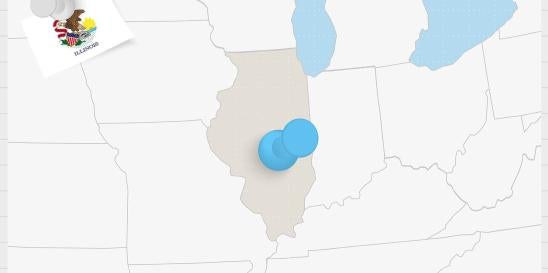A federal judge has granted a preliminary injunction prohibiting the Illinois Department of Labor (IDOL) from enforcing the equivalent-benefits provision of the Illinois Day and Temporary Labor Services Act (IDTLSA). Staffing Services Association of Illinois, et al. v. Flanagan, No. 1:23-cv-16208 (N.D. Ill. Mar. 11, 2024). That provision was set to go into effect on April 1, 2024.
The court found the plaintiffs, a group of temporary staffing agencies and industry associations, sufficiently demonstrated this provision was preempted by the Employee Retirement Income Security Act of 1974 (ERISA) and the agencies would suffer irreparable harm if the IDOL enforced the provision.
Background
Governor J.B. Pritzker signed into law several amendments to the IDTLSA (codified as Public Act 103-437) on Aug. 4, 2023. The amendments imposed expansive new duties on both Illinois staffing agencies and all employers that rely on temporary laborers from agencies (referred to as “third-party clients”). The amendments became effective immediately upon Governor Pritzker’s signature.
The significant changes included a provision requiring that, once a temporary laborer is assigned to a third-party client for more than 90 days, the temporary laborer must receive the same rate of pay and “equivalent benefits” as a comparable direct-hire employee of the third-party client would receive. The amendments also mandated safety training and notice obligations for agencies and their third-party clients.
On Nov. 9, 2023, the law was amended again to delay implementation of Section 42 — the equal pay and benefits provisions — until April 1, 2024.
A group of staffing agencies and associations then sued to enjoin the following three new provisions:
- Section 42 – which requires agencies to pay temporary laborers either “equivalent benefits” as the lowest paid, comparable, directly hired employee at the third-party client or “the hourly cash equivalent of the actual cost of benefits” after 90 days of assignment at the same worksite;
- Section 11 – which requires an agency to give written notice to a temporary laborer of a “labor dispute” at a third-party client assignment and grants temporary laborers the right to refuse the assignment; and
- Section 67 – which grants a private right of action to any “interested party” to enforce these and other obligations.
The court did not enjoin Sections 11 and 67, but it granted the preliminary injunction prohibiting enforcement of the equivalent-benefits provision of Section 42.
ERISA Preemption
The court first found that the plaintiffs’ challenge of the equivalent-benefits provision would likely be successful on the grounds that this provision is preempted by ERISA.
ERISA preempts all state laws that “relate to” (in other words, have a connection with or reference to) any employee-benefit plan. Courts consider whether a state law governs a central matter of plan administration or interferes with nationally uniform plan administration to determine relatedness.
The court found that Section 42 was preempted because it had a “connection with” ERISA plans, explaining the law (1) directly affected plan administration by requiring the consideration and analysis of individual plans in a way that impeded uniformity; and (2) forced agencies to create an administrative scheme to conduct the ongoing, discretionary analysis required by Section 42.
Irreparable Harm
Next, the court found that agencies would face irreparable harm if the IDOL enforced the equivalent-benefits provision of the IDTLSA.
According to the court, compliance with this part of the IDTLSA would force staffing agencies to incur the expense and burden of determining the relevant values of benefits and creating, selecting, modifying, or supplementing existing ERISA plans or paying the monetary difference. Agencies would need to develop new administrative systems and hire additional human-resources staff to comply. The court determined that such effects constituted irreparable harm.
Balance of Equities
Finally, the court determined that the harm of denying the injunction would be greater than the harm to the IDOL and the public interest of granting one.
Although the IDOL argued that Section 42 created important protections for vulnerable temporary laborers, this public interest was not sufficient to overcome the harm to agencies, as well as the public interest represented by the Supremacy Clause of the U.S. Constitution and Congress’ decision to ensure the uniformity of law related to ERISA plans.
Next
Following this decision, the IDOL may not enforce the equivalent-benefits provision of Section 42 of the IDTLSA. The IDOL has 30 days to appeal the court’s decision. Moreover, the Illinois Legislature is in session, and it might seek to further amend the law.
The rest of the IDTLSA remains in effect, except for the equal-pay provision, which is effective April 1, 2024. This means that, although the court’s decision enjoins the requirement to provide “equivalent benefits,” temporary laborers who are assigned to a third-party client for more than 90 days after April 1, 2024, will be entitled to receive the same rate of pay as a comparable directly hired employee.
Although the IDOL proposed regulations in August 2023 to provide further guidance on the law, it has yet to issue any final regulations.
Illinois employers should discuss IDTLSA compliance with employment counsel.






 i
i


